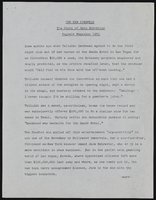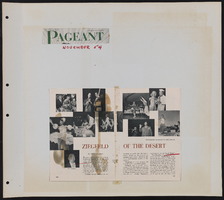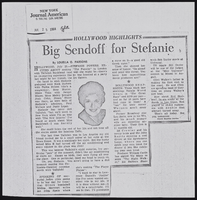Search the Special Collections and Archives Portal
Search Results
Tonnie Sumler oral history interview
Identifier
Abstract
Oral history interview with Tonnie Sumler conducted by Claytee D. White on May 21, 1996 for the UNLV University Libraries Oral History Collection. Sumler talks about moving from Fordyce, Arkansas to Las Vegas, Nevada in 1989, seeking better opportunities. She expresses some concern for her daughter's high school education in Las Vegas, believing the smaller class sizes in Fordyce would be better, and then talks about how she started working as a housekeeper for Caesars Palace Hotel and Casino after joining the Culinary Workers Union. She explains that there was a possibility of a strike in 1997 and details some of the reasons why.
Archival Collection
Ida Webb oral history interview
Identifier
Abstract
Oral history interview with Ida Webb conducted by Claytee D. White on February 29, 1996 for the African Americans in Las Vegas: a Collaborative Oral History Project. In this interview, Webb discusses her childhood in the American South. She discusses her family's move from Tallulah, Louisiana to McNary, Arizona, and then their migration to Las Vegas, Nevada. Webb shares her experiences as a young African American mother in Las Vegas in the 1940s and the things her and her husband did to provide for their family. She shares her views on her marriage and her views on African American culture of the time. Webb discusses her husband's civic involvement and his job at the Las Vegas Sun newspaper. She details her experiences working in the hospitality industry for such early casinos as the El Rancho Hotel & Casino, The Flamingo Hotel & Casino, and the Last Frontier Hotel & Casino. She shares her own civic involvements and her participation in the Culinary Workers Union Local 226.
Archival Collection
Audio recording clip of interview with Essie Shelton Jacobs by Claytee D. White, February 1, 1996, and April 15, 1996
Date
Archival Collection
Description
Part of an interview with Essie Shelton Jacobs by Claytee White on February 1, 1996 and April 15, 1996. Jacobs discusses her role as a shop steward in the Culinary Union and describes community relations with the union.
Sound

Transcript of interview with Hugh E. Key by Bob Bush, February 21, 1980
Date
Archival Collection
Description
On February 21, 1980, collector Bob Bush interviewed porter and retired military man, Hugh E. Key (born on November 17th, 1919 in Fordyce, Arkansas) in Las Vegas, Nevada. This interview covers the life of a Las Vegas old-timer. Hugh Keys’ wife, Mrs. Key, is also present during the interview and offers a few remarks.
Text
Barbara Jean Drew oral history interview
Identifier
Abstract
Oral history interview with Barbara Jean Drew conducted by Claytee D. White on May 17, 2021 for African Americans in Las Vegas: a Collaborative Oral History Project. Barbara Drew is the Dean of the Academy for Ministers, teaches Bible study, and performs other spiritual work at New Jerusalem Worship Center. Drew migrated to Las Vegas from Fortune Fork, Louisiana, just two miles outside the city limits of Tallulah.
This interview covers life in the Black community beginning when Drew arrived in 1961. She spoke about the importance of businesses like the Brown Derby, Hamburger Heaven, and the Town Tavern that hosted jazz on Sunday afternoons with a dance floor that she enjoyed. She discussed her first job running American Linen, a Dry Cleaners owned by Phil Shapiro; Shapiro mentored Drew, teaching her about business operations, purchasing property for her family, bookkeeping, and the importance of having a bank account. She also spoke of a neighborhood where neighbors helped neighbors and opportunities that flourished throughout the Black community. Subjects discussed include: Jackson Ave, Town Tavern, New Jerusalem Worship Center, Kasper Park, Berkley Square, and Phil Shapiro.
Archival Collection



